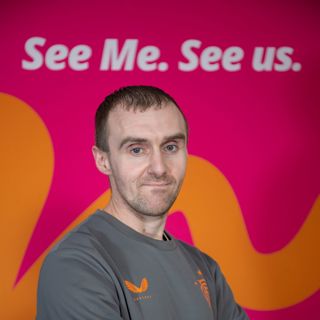Tommy's Story

When told by a health care professional that I was an “enigma” because I was a man with an eating disorder, it made me think maybe there was something wrong with me.
This made it even more difficult for me to accept help as part of my recovery.
At one point, I was even told I didn’t have an eating disorder and was misdiagnosed with Munchausen Syndrome. They believed I was trying to harm myself because I wanted attention from other people.
Having heard those two things made me think I was the only one struggling and I pushed people away.
I didn't want support. I trusted them because they were the professionals, so they must know what they’re talking about.
I thought to myself, ‘Am I doing this for attention or is there something wrong with me? Is it all my fault?’
It made it more difficult for me to accept that I actually had an eating disorder, which is a big part of recovery. You've got to accept you've got a problem.
When I started to tell people of my mental health status, those closest to me considered me a threat. For some reason, they thought I would be a danger to them. Even to this day, they still kind of think that.
Throughout my journey, my dad has really been there for me, which was surprising because he’s always been someone that would bottle up his feelings. I remember him saying that he kept his ‘tears for his pillow’. He always believed in this idea that a man shouldn't cry and you shouldn't show your feelings.
For him to actually open up and be helpful – I didn’t expect that.
The media plays a big part in how mental illnesses are viewed. It pushes out a narrative, especially when you see movies surrounding people with mental health problems.
It's also probably that most people have never really seen or spoken to anybody with a mental health problem. They don’t know that they're more than this label.
I remember being in hospital about 10 years ago, and my eating disorder was called a ‘disease’ by the media.
There’s been a big change in how they go about reporting on mental illness.
I remember a film crew coming in to see me in hospital, and I was in my boxer shorts. I was really unwell at that point and they were taking pictures of me from every angle.
That was 10 years ago, and that wouldn’t happen today.
One of the biggest changes in the last decade that has helped to break down some barriers is the way celebrities have become more open about their own struggles.
These are the kind of people folk look up to, and who are meant to have everything in life, and they’re speaking up about how they’re suffering. But I still think we have a long way to go.
At the very start, when I started speaking out about my eating disorder, people thought I just wanted attention. But actually, I found that a lot of people who were suffering in silence reached out to me and started to speak about their own problems.
If speaking about my problems, encourages one person to come forward and get help, then that’s great. I don’t want people to go through all the issues that I went through. I want to help people.
